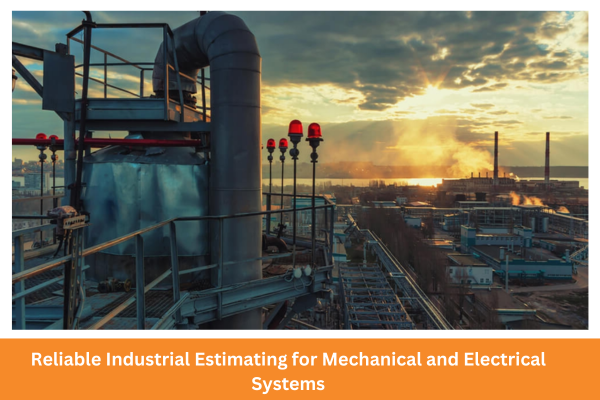In the industrial construction industry, mechanical and electrical (M&E) systems play a vital role in the functionality, safety, and efficiency of a facility. Whether constructing a manufacturing plant, power plant, refinery, or any other industrial structure, the proper estimation of mechanical and electrical systems is crucial for the overall success of the project. Reliable industrial estimating services ensure that all components of the M&E systems are accounted for, costs are controlled, and the project stays on budget and on schedule. This article explores why M&E estimating is so important, the components involved, and how precision in industrial estimating leads to successful project outcomes.
The Importance of Accurate Industrial Estimating for Mechanical and Electrical Systems
Industrial projects often involve complex M&E systems that require precise calculation and planning. Mechanical systems may include heating, ventilation, and air conditioning (HVAC), piping, and equipment installations, while electrical systems cover wiring, lighting, and power distribution. Estimating the cost and materials for these systems can be challenging due to the complexity of their design, the wide variety of materials used, and the significant labor involved.
Here are several key reasons why accurate and reliable industrial estimating for mechanical and electrical systems is crucial:
1. Cost Control and Budget Management
Accurate industrial estimating ensures that mechanical and electrical systems are accounted for within the project’s budget. M&E systems can account for a large portion of a construction project’s overall cost, so it is essential to have a reliable estimate to avoid budget overruns. A well-structured estimate helps contractors, project managers, and developers plan effectively and ensure that adequate funds are allocated for the necessary components and labor.
2. Timely Completion of the Project
Industrial construction projects typically operate on tight schedules. Any delay in the installation of M&E systems can disrupt the entire project timeline. Accurate estimates enable construction teams to order the correct quantities of materials ahead of time and ensure that labor is available when needed. Precise planning based on accurate estimates helps to prevent delays that could otherwise lead to costly project extensions and missed deadlines.
3. Risk Mitigation
Misestimating the components required for M&E systems can lead to significant risks. Underestimating the amount of wiring or piping needed, for example, could result in material shortages, causing delays and additional costs. Overestimating could mean that excess materials are purchased, leading to waste and additional storage costs. Reliable industrial estimating helps mitigate these risks by ensuring that the correct quantities of materials are ordered, and the right labor is scheduled.
4. Code Compliance and Safety
M&E systems are subject to local codes and regulations, which vary depending on the location and type of project. Non-compliance can lead to safety hazards, legal issues, and costly rework. Accurate estimating ensures that all M&E components are designed and installed according to the appropriate codes and standards. This reduces the risk of non-compliance and ensures that the project meets all regulatory requirements.
Key Components of Industrial Estimating for Mechanical and Electrical Systems
To create an accurate estimate for mechanical and electrical systems in industrial construction projects, estimators must account for several key components. These components are essential in determining the cost, materials, and labor required for the project.
1. Mechanical Systems Estimating
Mechanical systems in industrial construction include HVAC systems, refrigeration, piping, and ventilation. Estimating the cost of mechanical systems requires a thorough understanding of the project’s layout, the design of the mechanical systems, and the materials required. Key aspects include:
- HVAC Systems: The installation of heating, ventilation, and air conditioning units involves calculating ductwork, equipment costs, and labor. Estimators must consider factors such as the size of the system, efficiency, and capacity to determine the costs involved.
- Piping Systems: Estimating the installation of pipes requires understanding the size, material, and routing of the system. The costs for pipes, valves, joints, and labor must be accounted for in the estimate.
- Ventilation Systems: Industrial facilities often require specialized ventilation systems for air quality control. Estimating ventilation systems involves the cost of ductwork, fans, and filters, as well as the labor involved in installation.
- Specialized Equipment: Mechanical estimating also includes the cost of equipment such as pumps, compressors, chillers, and other machinery needed for the mechanical system. These components often require specialized installation and must be estimated accordingly.
2. Electrical Systems Estimating
Electrical systems in industrial construction projects include power distribution, wiring, lighting, and specialized electrical components. Estimating electrical systems involves:
- Power Distribution Systems: This includes transformers, generators, and circuit panels, which are crucial for managing the electrical flow within a facility. Estimators must account for the quantity of equipment, installation labor, and materials required.
- Wiring and Cabling: Electrical systems require a substantial amount of wiring for power distribution, lighting, and specialized systems. Estimators must calculate the correct amount of wiring, conduit, and fittings necessary for the project.
- Lighting Systems: Lighting is essential for safety and functionality in any industrial building. Estimating the cost of electrical lighting systems involves calculating the number and types of fixtures required, including energy-efficient options like LED lights.
- Specialized Electrical Components: Some industrial projects may involve specialized electrical components such as backup generators, uninterruptible power supplies (UPS), and control panels for automated processes. These components require careful estimation to ensure accurate pricing and installation.
3. Labor Estimating for M&E Systems
Labor costs are a significant portion of any industrial project, and M&E systems are no exception. Accurate labor estimating involves assessing the number of skilled workers required for installation, the duration of the work, and the cost of labor based on the project’s location. This includes electricians, HVAC technicians, plumbers, and other specialists.
4. Material Takeoff for M&E Systems
Material takeoff is the process of quantifying all materials required for the mechanical and electrical systems. This includes calculating the quantities of pipes, wires, HVAC units, and electrical components. Accurate material takeoff ensures that the correct amount of materials is ordered, helping to avoid shortages or excess inventory.
Why Choose Precision Estimator for Industrial M&E Estimating Services?
At Precision Estimator, we specialize in providing detailed and reliable estimating services for mechanical and electrical systems in industrial construction projects. Our team of experts uses advanced estimating software and tools to generate precise estimates that help contractors and project managers make informed decisions.
Here’s why Precision Estimator is the ideal partner for your M&E estimating needs:
- Expertise and Experience: Our team has years of experience estimating mechanical and electrical systems for industrial projects of all sizes. We understand the complexities involved and can provide accurate estimates for even the most challenging projects.
- Advanced Software Tools: We use cutting-edge estimating software that allows us to generate accurate, detailed estimates quickly and efficiently. Our software ensures that all material quantities and labor requirements are correctly calculated.
- Comprehensive Estimates: We provide a full breakdown of costs for mechanical and electrical systems, including materials, labor, and equipment. Our estimates are clear, detailed, and easy to understand, helping you make informed decisions throughout the project.
- Timely Delivery: At Precision Estimator, we understand that time is critical in industrial construction projects. We deliver our estimates on time, helping you stay on schedule and avoid delays.
- Cost-Effective Solutions: Our estimating services help you avoid costly errors, material shortages, and budget overruns. We work with you to identify cost-saving opportunities without compromising quality or safety.
Conclusion
Reliable industrial estimating for mechanical and electrical systems is essential for the success of any industrial construction project. Accurate estimates help ensure that the project stays within budget, is completed on time, and meets all regulatory requirements. At Precision Estimator, we provide detailed, reliable, and cost-effective estimating services for mechanical and electrical systems, helping you achieve your construction goals efficiently and effectively. Whether you are building a manufacturing plant, power station, or refinery, our expertise and precision can guide your project to success.
TEKCOOL Anti Fatigue Kitchen Rug Sets 2 Piece Non Slip Kitchen Mats for Floor Cushioned Kitchen Rugs and Mats Waterproof Comfort Standing Mat Runner for Kitchen,Home Office,Sink,Laundry (Line MAT)
₹549.00 (as of 21 November, 2024 18:32 GMT +05:30 - More infoProduct prices and availability are accurate as of the date/time indicated and are subject to change. Any price and availability information displayed on [relevant Amazon Site(s), as applicable] at the time of purchase will apply to the purchase of this product.)Zulaxy Photo Frame Hooks for Wall Without Drilling, 10 Pack Self Adhesive Hooks for Wall Heavy Duty Strong Nail Free for Hanging Photo Frame (Hanging Hook, Transparent) Stainless Steel
₹274.00 (as of 20 November, 2024 18:31 GMT +05:30 - More infoProduct prices and availability are accurate as of the date/time indicated and are subject to change. Any price and availability information displayed on [relevant Amazon Site(s), as applicable] at the time of purchase will apply to the purchase of this product.)Amazon Brand - Presto! Garbage Bags Medium 180 Count|19 x 21 inches Black , For Dry & Wet waste|30 bags/roll (Pack of 6)
₹335.00 (as of 20 November, 2024 18:31 GMT +05:30 - More infoProduct prices and availability are accurate as of the date/time indicated and are subject to change. Any price and availability information displayed on [relevant Amazon Site(s), as applicable] at the time of purchase will apply to the purchase of this product.)Bajaj Immersion 1500 Watts Water Heater Rod | Nickel Plated Heating| Copper | ISI Certified | 2 Years Warranty | Silver
₹599.00 (as of 20 November, 2024 18:31 GMT +05:30 - More infoProduct prices and availability are accurate as of the date/time indicated and are subject to change. Any price and availability information displayed on [relevant Amazon Site(s), as applicable] at the time of purchase will apply to the purchase of this product.)Amazon Brand - Presto! Garbage Bags Large 90 Count|24 x 32 Inches Black , For Dry & Wet waste|15 bags/roll (Pack of 6)
₹345.00 (as of 20 November, 2024 18:31 GMT +05:30 - More infoProduct prices and availability are accurate as of the date/time indicated and are subject to change. Any price and availability information displayed on [relevant Amazon Site(s), as applicable] at the time of purchase will apply to the purchase of this product.)Discover more from The General Post
Subscribe to get the latest posts sent to your email.





